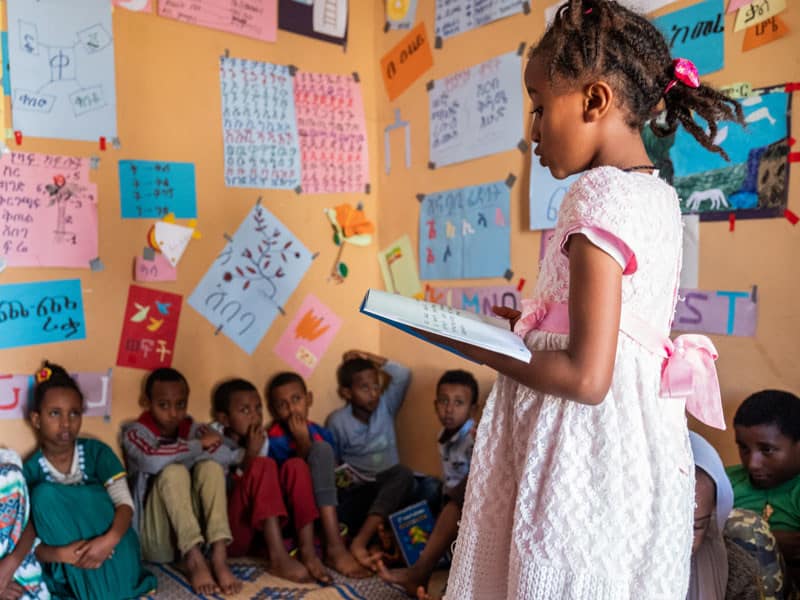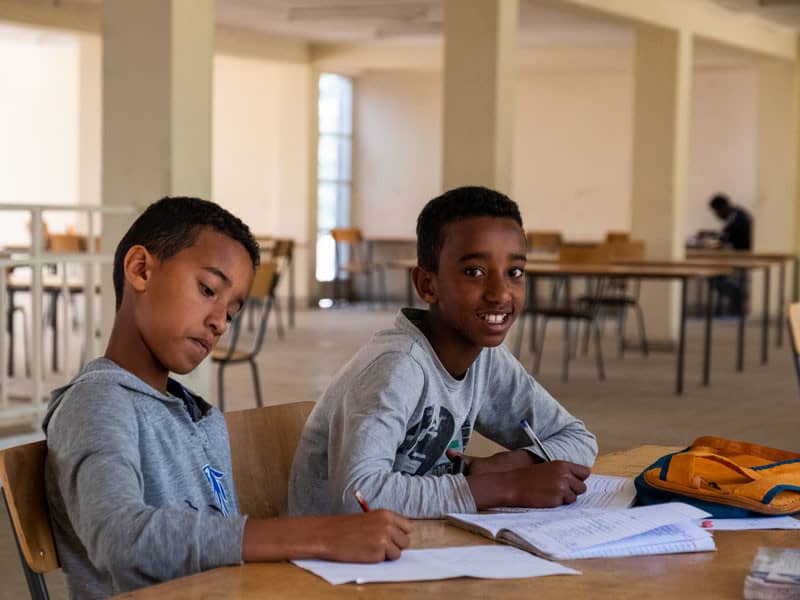Insights from the READ II program’s Bridget Lombardo
Ethiopia has made great strides in increasing girl’s enrollment in school during the past 20 years, but that alone can’t solve pervasive inequalities in education and society at large. Only 53 percent of Ethiopian girls finish primary school, and a quarter attend secondary school, according to UNICEF. Inequalities and social norms create many roadblocks in girls’ path to education.
One major barrier is violence against women and girls, and more specifically school-related violence against women and girls, which happens not just at school, but also on the way to school, at home, in communities and online.
The USAID-funded READ II program in Ethiopia incorporates a sensitive approach in its work to strengthen literacy instruction and student support for 15 million children. The program is implemented by Creative in partnership with Education Development Center, World Vision and the government of Ethiopia.

In this Q&A, READ II Senior Program Manager and Gender Advisor Bridget Lombardo shares her insights on how issues affect girls’ learning in Ethiopia and discusses the program’s work with the Ministry of Education to create equitable learning environments.
Can you tell us a little bit about the issue of violence against women and girls in Ethiopia? What are the risks for girls in particular?
Bridget Lombardo: Unfortunately, violence against women and girls is under researched and thus not well addressed in Ethiopia. The data that does exist indicate that violence against women and girls is highly prevalent. What is also worrying is that, according to the Demographic and Health Survey, 66 percent of women never divulge the violence. Violence against women and girls is a silent issue. I’ve spoken to men in some regions who say violence against women simply doesn’t exist in their region, but when you speak to women it’s an entirely different, devastating story. Women need to be heard and feel supported in seeking help and justice.
Ethiopia’s legal framework has language that largely protects women and child rights, supports equality, and does have laws against most forms of violence against women and girls. However, marital rape is not considered to be a crime. Although there are laws, there seem to be very few convictions of rape.
Research on school-related violence against women and girls is even more scarce. READ II conducted a rapid assessment in 2018, and among female students interviewed, nearly 100 percent said that they fear violence in and around school, and almost all of them said that they have never told an adult. Of course, the COVID pandemic has put more girls and women at risk, although data is still lacking on this. We do know that the incidence of child, early and forced marriage (CEFM) has increased. The Regional Education Bureau of Amhara Region reported that they stopped 500 CEFMs since the pandemic began.

How do issues and violence against women and girls affect girls’ education?
Bridget: We know from global research that violence against women and girls affects students in many ways, and I want to emphasize that this means both boys and girls. Of course, girls suffer disproportionately from violence, but male students tend to be more susceptible to corporal punishment and physical violence.
Female students are more susceptible to verbal harassment and sexual violence, among others. We know that violence against women and girls to varying degrees affects, both short and long-term, self-esteem, sense of security, and even physical health. Of course, girls who experience sexual violence are at risk of STIs, early pregnancy, HIV, and other health problems. We know that all of this affects attendance, dropouts, and academic performance.
There is some really interesting research in other countries coming out quantifying how violence against women and girls affects academic performance. For example, there was a study conducted in Ghana, Botswana, and South Africa that found that students who experienced bullying scored lower than those who were not bullied by between 13 and 32 points on science, reading and mathematics. That’s significant! According to the UN, violence against women and girls is associated with the average loss of 1 primary grade of schooling, translating to a yearly cost of around $17 billion to low- and middle-income countries. These reasons alone should make Education Officials make violence against women and girls, which is also a violation of human rights, a very high priority.
Why is it important to take a gender-sensitive approach to education?
Bridget: Many people think that if we just get more girls in school, then we’ve done our job. Even if we achieve gender parity in schools, there are so many inequities that make it more difficult for girls to complete school and succeed in school. Putting aside the challenges girls face in the home, curriculums are based on the values of the society, and Ethiopian society is very patriarchal. I have to give the Ministry of Education a lot of credit for numerous initiatives to make schools more gender equitable, but that’s just policy. Educators are still entrenched in their societies and biases, so they must be trained in gender-responsive pedagogy, monitored, and retrained.
To give a better sense of what I mean, some teachers believe that boys are naturally better at math and science than girls. Research shows that our biases can affect performance, something called the Pygmalion Effect. So, even if it’s unintentional, teachers who have this bias will inadvertently lead girls do more poorly and boys to do better in math and science.
Another example is well-intentioned teachers sometimes overly praise girls for small achievements and are a bit tougher on boys. The result of that is that girls understand they don’t have to work as hard to get praised, and maybe not much is expected from them. Another important issue is the sheer lack of female role models. Although women can also be biased in their teaching practices, it’s still so important for women to be equally represented in shaping society’s children. So, unless you look beyond the numbers, girls will continue to lag behind boys in academic achievement.

What is the role of schools in preventing violence against women and girls and supporting girls?
Bridget: Everyone has a role in preventing violence against women and girls – the community, parents, the government, students and not least of all, schools. We know that violence happens at school. The UNGEI Global Working Group reports that 1 in 4 girls are never comfortable using the latrine at school. While part of that discomfort might be sanitary conditions, we know that violence around school latrines is common. Schools can take simple steps to mitigate this, such as separating girls’ and boys’ latrines, locks on doors, and ensuring adults are monitoring the area.
Although it is everyone’s responsibility to address violence against women and girls, schools can provide the system for reporting and lead efforts to collaborate with the community to not only raise awareness, but to prioritize students’ safety and wellbeing and to respond appropriately to students’ reports of violence. And, as it’s schools’ responsibility to instill society’s values in students, schools should incorporate human rights, life skills and gender equality into their curriculum. Gender inequality and power imbalance are the root causes of violence against women and girls, so schools need to make sure that their school environment is gender equitable.
How does READ II engage with schools and communities on gender issues and preventing violence against women and girls?
Bridget: The three things that guide READ II’s gender strategy are gender integration in all materials and interventions, supporting the Ministry’s agenda so that all interventions are sustainable, and using a gender transformative approach, meaning that we try to address the deep gender biases, even if it’s not very comfortable.
READ II is an education project, but we know that gender biases and violence against women and girls affect academic performance. So, all of our teacher training workshops and teaching materials address those biases and provide practical solutions for gender equitable teaching practices. We know from our rapid assessment that female teachers sometimes miss out on professional development opportunities due to a lack of childcare. So, READ II responded by providing childcare at all training sites.
Some other ways that we are directly supporting schools to be more gender equitable are supporting girls clubs with training and materials, providing tools to help schools make their environment more equitable, and providing school grants to help them implement them. We’re about to launch a 13-episode radio drama on violence against women and girls in six languages. We piloted it in Amharic already and got some really good feedback and some indication that it’s sparking the right discussions and challenging some harmful gender norms. We’ll know more after the end line survey.
READ II has been supporting the Ministry of Education to strengthen their strategy to address violence against women and girls, but one of the challenges is a lack of data. This has been READ II’s greatest challenge in implementing its gender strategy. We have provided some orientation on violence against women and girls prevention and response, but we need to monitor how well that is working. We have to support the Ministry’s agenda, and violence against women and girls is not given nearly the attention it deserves.
One area in which we’ve started showing some real success in supporting the Ministry’s agenda is addressing the barriers to female leadership in the education sector. READ II conducted the first gender audit in the education sector and followed up with regional and district-level action plans and then a series of female leadership conferences. We built some momentum around this, and the Ministry has committed to continuing the implementation of the action plan.
READ II is currently working with the Ministry of Education to run a small radio campaign around the 16 Days of Activism Against Gender-Based Violence. We have developed two radio spots in Amharic, Afan-Oromo and Somali. There are two basic messages. The first is that it is never the victim’s fault when violence occurs. Every human being has a right to have environment which is free of violence and fear, and everyone has a responsibility to make sure others, especially girls, are safe in their community, school, home, public transport and everywhere. The second message states that all children have the right to go to school and encourages people to make sure girls get back to school when it reopens.